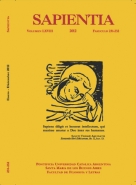Por favor, use este identificador para citar o enlazar este ítem:
https://repositorio.uca.edu.ar/handle/123456789/3890| Título: | La causalidad del Motor inmóvil según Aristóteles | Autor: | Berti, Enrico | Palabras clave: | Aristóteles, 384-322 a.C.; MOTOR INMOVIL; CAUSA EFICIENTE; FELICIDAD; FILOSOFIA; CAUSA FINAL | Fecha de publicación: | 2012 | Editorial: | Pontificia Universidad Católica Argentina. Facultad de Filosofía y Letras | Cita: | Berti, E. La causalidad del Motor inmóvil según Aristóteles [en línea]. Sapientia. 2012, 68 (231-232). Disponible en: https://repositorio.uca.edu.ar/handle/123456789/3890 | Resumen: | Riassunto: Contro l’interpretazione tradizionale, l’articolo sostiene che il Motore immobile per Aristotele non è causa finale del movimento del cielo, ma ne è piuttosto la causa efficiente, come risulta da Metaph. XII 6. Il Motore immobile è causa finale solo nel senso che egli è fine della sua stessa atitività, come è provato dal fatto che questa è piacere (Metaph. XII 7). L’interpretazione tradizionale, secondo la quale il cielo si muove per amore del Motore immobile, cercando di imitare la sua immobilità per mezzo del moto circolare, deriva dal tentativo di conciliare il pensiero di Aristotele con la concezione platonica dell’imitazione della realtà intelligibile da parte della realtà sensibile. Il motore immobile è fine dell’uomo solo nel senso che è oggetto della conoscenza in cui consiste la felicità umana (Eth. Eud. VIII 3). Abstract: Against the traditional interpretation, the article maintains that the unmoved Mover for Aristotle is not a final cause, but he is rather an efficient cause of the heaven’s motion, as it results from Metaph. XII 6. The unmoved Mover is a final cause only in the sense that he is the end of his own activity, as it is proved from the fact that his activity is a pleasure (Metaph. XII 7). The traditional interpretation, following which the heaven moves itself for the love of the unmoved Mover, trying to imitate his immobility trough the circular motion, derives from the attempt to reconcile Aristotle’s thought with the Platonic conception of imitation of the intelligible by the sensible reality. The unmoved Mover is the end of man only in the sense that he is the object of the knowledge in which the human happiness consists (Eud. Eth. VIII 3). |
URI: | https://repositorio.uca.edu.ar/handle/123456789/3890 | ISSN: | 0036-4703 | Disciplina: | FILOSOFIA | Derechos: | Acceso Abierto | Fuente: | Sapientia. 2012, 68 (231-232) |
| Aparece en las colecciones: | SAP - 2012 Vol LXVIII nro. 231-232 |
Ficheros en este ítem:
| Fichero | Descripción | Tamaño | Formato | |
|---|---|---|---|---|
| causalidad-motor-inmovil-aristoteles.pdf | 3,78 MB | Adobe PDF |  Visualizar/Abrir |
Visualizaciones de página(s)
564
comprobado en 30-abr-2024
Descarga(s)
7.939
comprobado en 30-abr-2024
Google ScholarTM
Ver en Google Scholar
Este ítem está sujeto a una Licencia Creative Commons

